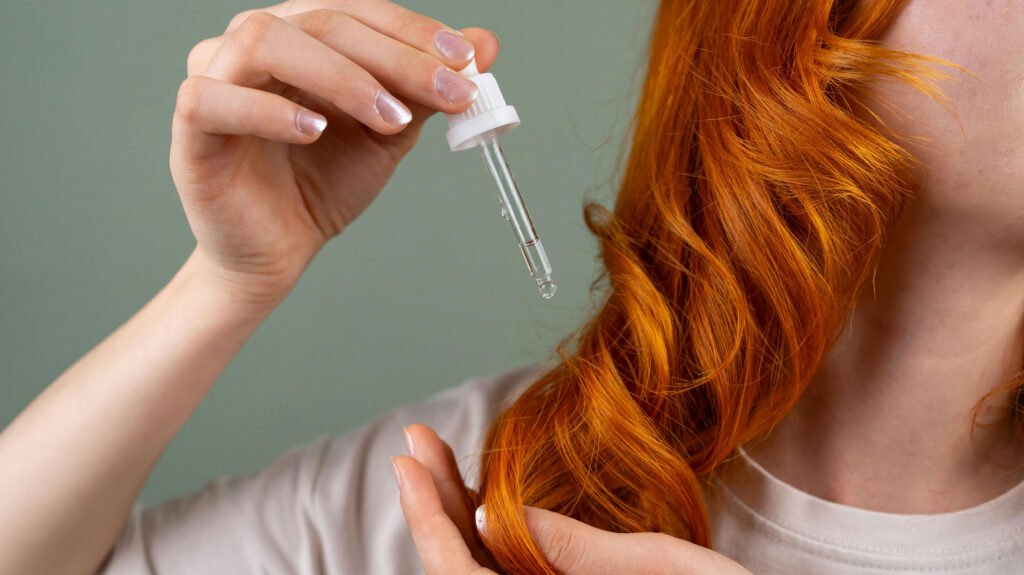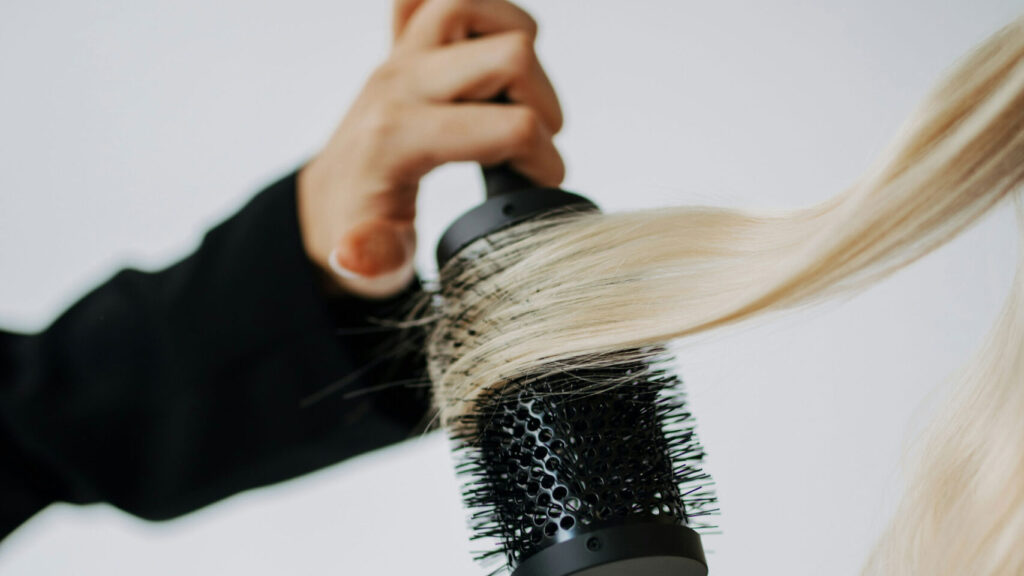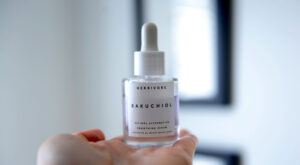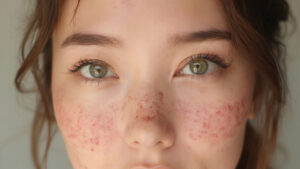You’re not alone if you are battling the frustrating effects of frizzy hair. Frizz can be caused by a variety of factors, including humidity, hair damage, and a lack of moisture. But the good news is, achieving smooth, silky strands is entirely possible with the right products and a consistent hair care routine. We’re diving into the best anti-frizz products, key ingredients to look for, and tips to keep your hair looking its best.
What Causes Frizzy Hair?
Before we look into solutions, let’s identify the source. Frizz occurs when the hair’s outer layer, the cuticle, is raised, allowing moisture from the air to enter and swell the hair shaft. The biggest contenders are:
- Humidity: High humidity is a major culprit, as the hair tries to absorb moisture from the air.
- Dry Hair: Hair that lacks moisture is more prone to frizz because the cuticle is already rough and open.
- Damage: Heat styling, chemical treatments, and even harsh brushing can damage the cuticle, leading to frizz.
- Hair Type: Naturally curly and wavy hair types are often more prone to frizz due to their cuticle structure.
The Secret to Smooth Hair: Key Ingredients to Look For
When you’re on the hunt for anti-frizz products, keep an eye out for these frizz-fighting ingredients:

- Humectants: These ingredients attract and retain moisture, helping to hydrate the hair. Examples include glycerin, hyaluronic acid, and propylene glycol.
- Emollients: These create a protective barrier on the hair shaft, sealing in moisture and smoothing the cuticle. Look for ingredients like argan oil, shea butter, coconut oil, and silicone (in moderation, as some prefer to avoid it).
- Proteins: Keratin and other proteins can help strengthen damaged hair and fill in gaps in the cuticle.
- Natural Oils: Jojoba oil, almond oil, and avocado oil can provide deep nourishment and shine without weighing hair down.
Top Products for Taming Frizz and Boosting Shine
Flyaways are the biggest struggle when styling your hair. You can spend hours on your hair, but the final result can still include flyaways. Here are some highly-rated and effective products that can transform your hair:
1. Anti-Frizz Shampoos & Conditioners
The foundation of any good anti-frizz routine starts in the shower. Look for formulas specifically designed to smooth and hydrate.
- Garnier Fructis Sleek & Shine Shampoo and Conditioner: This affordable duo is widely praised for its ability to tame frizz and leave hair feeling soft and smooth. Many users find it effective against humidity.
- Olaplex No. 4 Bond Maintenance Shampoo & No. 5 Bond Maintenance Conditioner: While a bit pricier, Olaplex is renowned for its bond-repairing technology, which can significantly improve hair health and reduce frizz caused by damage.

2. Leave-In Conditioners & Serums
These products provide an extra layer of protection and moisture throughout the day.
- It’s a 10 Miracle Leave-In Product: A cult favorite, this spray offers multiple benefits, including frizz control, detangling, and heat protection.
- Moroccanoil Treatment: This iconic argan oil-infused treatment is fantastic for adding shine, smoothness, and controlling frizz without feeling greasy. A little goes a long way.
3. Styling Creams & Gels
For targeted frizz control and styling, these products are your best friends.
- Living Proof No Frizz Styling Cream: This cream is formulated with a patented healthy hair molecule that blocks humidity without weighing hair down.
- OUAI Hair Oil: A versatile oil that can be used on damp or dry hair to smooth flyaways, add shine, and protect against heat.

4. Hair Masks for Intense Hydration
Weekly hair masks can provide a deep dose of moisture, essential for preventing frizz.
- Briogeo Don’t Despair, Repair! Deep Conditioning Mask: This popular mask is packed with nourishing ingredients to strengthen hair and reduce breakage, leading to less frizz.
- Hydrating Face Mask (for hair?): While the term “hydrating face mask” typically refers to skincare, the concept of deep hydration is crucial for hair. For a truly excellent hair mask, consider options like the K18 Leave-In Molecular Repair Hair Mask, which repairs damage at a deeper level, leading to smoother, less frizzy hair.
Tips for a Frizz-Free Future
Beyond products, these practices can help you maintain smooth, silky strands:
- Rinse with cold water. A final rinse with cool water can help seal the hair cuticle, locking in moisture and reducing frizz.
- Air dry when possible: Minimize heat styling, as excessive heat can damage the hair and lead to frizz. If you must use heat, always apply a heat protectant.
- Use a microfiber towel or cotton t-shirt: Regular towels can rough up the cuticle. Gently blot your hair dry with a microfiber towel or an old cotton t-shirt instead.
- Avoid over-brushing dry hair: Brushing dry, frizzy hair can disrupt the cuticle even further. Use a wide-tooth comb on wet hair, or a brush specifically designed for detangling.
- Sleep on a silk pillowcase: Silk causes less friction than cotton, reducing breakage and frizz while you sleep.

Frequently Asked Questions
What causes frizzy hair?
Frizzy hair is primarily caused by a raised hair cuticle, which allows moisture from the air (especially in humid conditions) to enter and swell the hair shaft. Other factors include dry hair lacking moisture, damage from heat styling or chemical treatments, and naturally curly or wavy hair types which often have a more open cuticle structure.
How can I make my hair smooth and silky instantly?
For instant smoothness, a leave-in conditioner or a few drops of hair oil can be highly effective. Apply a small amount to damp hair, concentrating on the ends, and then style as usual. For immediate touch-ups on dry hair, a lightweight serum or hair oil can quickly smooth down flyaways and add shine.
What ingredients should I look for in anti-frizz products?
When choosing anti-frizz products, prioritize ingredients that hydrate and seal the hair cuticle. Look for humectants like glycerin and hyaluronic acid to attract moisture, emollients such as argan oil and shea butter to create a protective barrier, and proteins like keratin to strengthen damaged hair.
What ingredients should I avoid if I have frizzy hair?
To minimize frizz, it’s best to avoid products with high concentrations of sulfates, as they can strip natural oils from your hair, leading to dryness. Additionally, be cautious of drying alcohols like ethanol and isopropyl alcohol, which can dehydrate the hair shaft and exacerbate frizz.
Does humidity cause frizzy hair, and how can I prevent it?
Yes, humidity is a major cause of frizzy hair because the hair tries to absorb moisture from the air when the cuticle is open. To prevent humidity-induced frizz, use anti-frizz serums or creams that create a barrier against moisture, ensure your hair is well-hydrated, and consider humidity-blocking styling products.
Can diet affect hair frizz?
Yes, a well-balanced diet plays a significant role in overall hair health, which can indirectly help reduce frizz. Ensure your diet includes sufficient protein, essential fatty acids (like omega-3s), and vitamins (such as biotin) to nourish your hair from within, promoting stronger, healthier strands.
What is the best way to dry frizzy hair to prevent more frizz?
To prevent frizz when drying your hair, avoid rubbing vigorously with a standard terry cloth towel, as this can rough up the cuticle. Instead, gently blot your hair with a microfiber towel or an old cotton t-shirt to absorb excess water. Air drying when possible is also beneficial, or if using heat, apply a heat protectant and use a diffuser on a low heat setting.
Are there any natural remedies for frizzy hair?
While commercial products are highly effective, some natural remedies can help. Argan oil, coconut oil, and shea butter can provide deep moisture and help smooth the hair cuticle. Applying a small amount as a leave-in treatment or hair mask can be beneficial.
The content provided in this blog is for informational and educational purposes only. All product recommendations and skincare suggestions are intended to serve as general guidance and should not be considered a substitute for professional advice. Individual skin types and conditions vary, so please use discretion when incorporating new products or routines. We strongly recommend consulting with a licensed dermatologist or qualified healthcare professional before beginning any new skincare treatments, especially if you have sensitive skin, pre-existing conditions, or are currently using prescribed medications.
Note: All product links are for informational purposes and do not constitute endorsements. Always perform a patch test before introducing new products into your routine.





